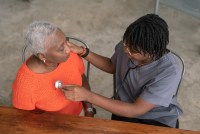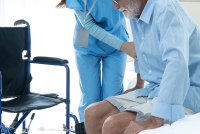Latest KFF Health News Stories
Florida Foster Kids Are Given Powerful Medications, but Feds Find State Oversight Lacking
A report by the U.S. Department of Health and Human Services raises troubling questions about the use of powerful medications within Florida’s child welfare system and the risk of overdoses or dangerous side effects if children are given the wrong combination of drugs.
As More Patients Email Doctors, Health Systems Start Charging Fees
Doctors say billing for email consultations reduces message volume and gives them more free time. The increasingly prevalent practice has also raised fears about negative impacts to patient care.
Pacientes reciben facturas por enviarles correos electrónicos a sus médicos
Con un fuerte aumento de los mensajes de correo electrónico durante la pandemia de covid, un número creciente de sistemas de salud han empezado a cobrar a los pacientes cuando los médicos y otros profesionales clínicos responden a sus mensajes.
Artificial Intelligence May Influence Whether You Can Get Pain Medication
To contain the opioid crisis, health and law enforcement agencies have turned to technology to monitor doctor and patient prescription data. Experts have raised questions about how these systems work and worry about their accuracy and potential biases. Some patients and doctors say they’re being unfairly targeted.
Dangers and Deaths Around Black Pregnancies Seen as a ‘Completely Preventable’ Health Crisis
Studies show that high rates of Black fetal and infant deaths are largely preventable — and part of systemic failures that contribute to disproportionately high Black maternal mortality rates.
Voters Rejected an Anti-Abortion Measure. State GOP Lawmakers Passed a Similar Bill Anyway.
The new Montana law contains a couple of significant differences from the measure voters rebuffed last fall.
New Weight Loss Drugs Carry High Price Tags and Lots of Questions for Seniors
Although nearly 40% of Americans 60 and older are obese, Medicare doesn’t cover weight loss medications. Meanwhile, studies haven’t thoroughly examined new drugs’ impact on older adults.
Mental Health Respite Facilities Are Filling Care Gaps in Over a Dozen States
As three years of pandemic stress accelerated an ongoing nationwide mental health crisis, peer respite programs diverted patients from overburdened emergency rooms, psychiatric institutions, and behavioral therapists. Now, more “respites” are opening.
As Low-Nicotine Cigarettes Hit the Market, Anti-Smoking Groups Press for Wider Standard
The first FDA-authorized cigarettes with 95% less nicotine than traditional smokes will go on sale in California, Florida, and Texas starting in early July. Anti-smoking groups oppose greenlighting just one plant biotech’s products and instead urge federal regulators to set a low-nicotine standard for the entire industry.
Cardiovascular Disease Is Primed to Kill More Older Adults, Especially Blacks and Hispanics
Cardiovascular disease is the biggest killer of older Americans, with Black and Hispanic people at higher risk. Despite medical advances, researchers say, disparities are expected to worsen in the coming decades.
La enfermedad cardiovascular podría matar a más adultos mayores hispanos
El dramático envejecimiento de la población de Estados Unidos y el número creciente de personas con afecciones como hipertensión, diabetes y obesidad —que aumentan el riesgo cardíaco— se espera que contribuyan a este escenario alarmante.
Remote Work: An Underestimated Benefit for Family Caregivers
The debate about whether employees should be required to return to the workplace has generally focused on commuting, convenience, and child care. A fourth C, caregiving, has rarely been mentioned.
California Confronts Overdose Epidemic Among Former Prison Inmates
Individuals newly released from prison are 40 times as likely to die of opioid overdoses than members of the general population, researchers say. In response, California corrections officials aim to arm departing inmates with an antidote that can be used to reverse the effects of opioid poisoning.
Se pagarán $50,000 millones como liquidación del acuerdo sobre opioides. Veremos cómo se gastan
La mayoría de los acuerdos estipulan que los estados deben gastar al menos el 85% del dinero que recibirán, en los próximos 15 años, en el tratamiento y la prevención de adicciones.
$50 Billion in Opioid Settlement Cash Is on the Way. We’re Tracking How It’s Spent.
Spending the money effectively and equitably is a tall order for state and local governments, and a lack of transparency in the process is already leading to fears of misuse.
Feds Move to Rein In Prior Authorization, a System That Harms and Frustrates Patients
The federal government wants to change the way health insurers use prior authorization — the requirement that patients get permission before undergoing treatment. Designed to prevent doctors from deploying expensive, ineffectual procedures, prior authorization has become a confusing maze that denies or delays care, burdens physicians with paperwork, and perpetuates racial disparities. New rules may not be enough to solve the problems.
Montana Seeks to Insulate Nursing Homes From Future Financial Crises
Lawmakers are considering creating standards to set Medicaid reimbursement rates. But industry observers wonder whether the move would be too little, too late to bolster a beleaguered industry.
States Seek Crackdown on Toxic Ingredients in Cosmetics to Close Gaps in Federal Oversight
Washington state regulators found formaldehyde, lead, and arsenic in lipstick, powder foundations, skin lotions, and hair products marketed to and popular with women of color. Now legislators there are seeking to ban the products and, like at least a dozen other states, make up for lax federal rules.
Abortion Debate Ramps Up in States as Congress Deadlocks
Abortion is a top issue for state lawmakers meeting for their first full sessions since Roe v. Wade was overturned.
Inside a Children’s Hospital: Struggling to Cope With a Surge of Respiratory Illness
Pediatric cases of RSV and flu have families crowding into ERs, as health systems juggle staff shortages. In Michigan, only 10 out of 130 hospitals have a pediatric ICU.
























